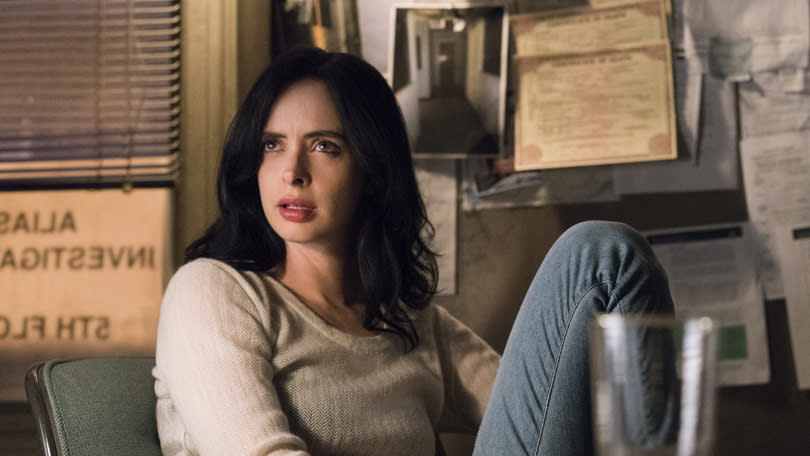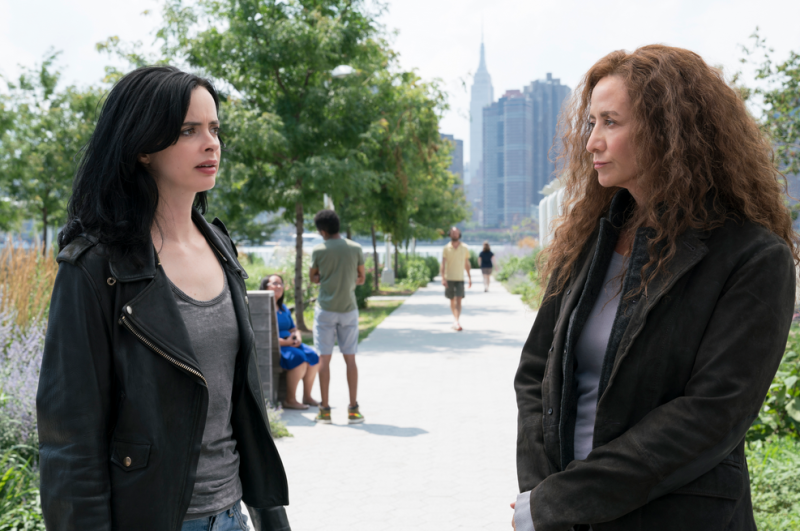In season 2, Jessica Jones became more of a superhero show – but that’s not exactly a good thing

This article contains significant spoilers for Jessica Jones season 2, up to and including the final episode.
Jessica Jones’ first season is rather straightforwardly the best piece of television that’s gone out under the Marvel banner. Indeed, it’s the only one of the Marvel Netflix shows you can unreservedly say is entirely compelling, without the need to interject any caveats; it’s also one of the best pieces of ‘superhero’ television full stop.
Much has been written about this – albeit perhaps not quite as emphatically as the above – and largely speaking the conclusion reached is that the first season of Jessica Jones was so good because of David Tennant’s performance as Kilgrave. This is mostly, but not entirely, correct. Tennant’s portrayal as Kilgrave is indeed a career highlight, and the intensity of his scenes with Krysten Ritter means they’re absolutely electric to watch. But it’s not simply because of Ritter and Tennant’s performances that this worked; after all, there’s no paucity of television out there where talented actors struggle to elevate the material they’re given.
No, Kilgrave – and, indeed, the first season of Jessica Jones as a whole – worked because there was a certain truth to him. The character served as part of Jessica Jones’ exploration of rape culture, of pervasive and insidious attitudes that can be observed in real life. A lot of the drama and tension comes from the fact that audiences are familiar with him, and those like him, both on a diegetic and extra-diegetic level; there’s something recognisable about Kilgrave, something that maps onto real life experiences.
Approaching the second season of Jessica Jones, there were doubts from some corners that this sophomore effort would falter without Kilgrave – that, lacking Tennant’s performance, the series wouldn’t reach quite the same heights as it previously did. In a sense, that turned out to be correct; not because of a lack of Kilgrave specifically, but of the themes he represented and the ideas that Jessica Jones was able to explore with him.

In light of this, it’s worth considering what Jessica Jones replaced Kilgrave with. Across season 2, we follow our eponymous hero as she’s drawn deeper and deeper into a convoluted conspiracy, uncovering information about the shady organisation that are responsible for her powers. In the sixth episode, it’s revealed that her mother – long believed to be dead – is in fact alive, has similar super powers to Jessica, and is extremely volatile.
Much of this falls flat. It’s difficult to isolate a single reason why; the performances are strong, as you’d expect, and it’s not like the concept behind the return of Jessica’s mother is uniquely awful. Yet it’s something that Jessica Jones isn’t particularly well suited to: the conspiracy angle is weak, and the return of Jessica’s mother marks a genre shift that the show can’t sustain. In essence, it’s because little of this is analogous to real experiences. A huge amount of the strength of Jessica Jones previously came from its ability to use the trappings of the superhero genre to tell a story about trauma and surviving abuse; here, it’s weighed down by old tropes and familiar archetypes. Where the fantasy angle of Kilgrave’s powers was used to great effect to tell a story about genuine human experiences, that’s not the case with the decidedly outlandish appearance of Jessica’s mother. Indeed, it’s not wholly clear what metaphor you’d construct with this plotline to reflect a real life experience.
With this genre shift, Jessica Jones becomes something it never really was before: a more straightforward superhero show. Or, at least, it becomes closer to that; it still manages to find the time to explore some engaging subplots, but struggles under the weight of the genre archetypes like a relative returned from the dead. It’s something that wouldn’t be out of place in a comic book, nor some of the other superhero TV offerings – but Jessica Jones always succeeded in part because it really was only nominally ‘superhero TV’.
It’s not, of course, that Jessica Jones Season 2 isn’t very good. Certainly, it has shortcomings – it has particularly poor pacing, for one thing – but there’s definitely still a lot to like. Ritter remains flawless, for one thing, and as already noted it does pull off some of the subplots.
But in season 2, Jessica Jones became a little less like it’s distinctive, x first season, and a little bit more like everything else on television.
And it’s difficult not to see that as a little bit of a shame.
Related:
The Defenders is less a story, and more of a drawn-out contractual obligation
Like this article? Hate this article? Why not follow me on twitter for more, or send me a message on facebook to tell me what you thought? You can also find more of my articles for Yahoo here, or check out my blog here.

 Yahoo Movies
Yahoo Movies 

